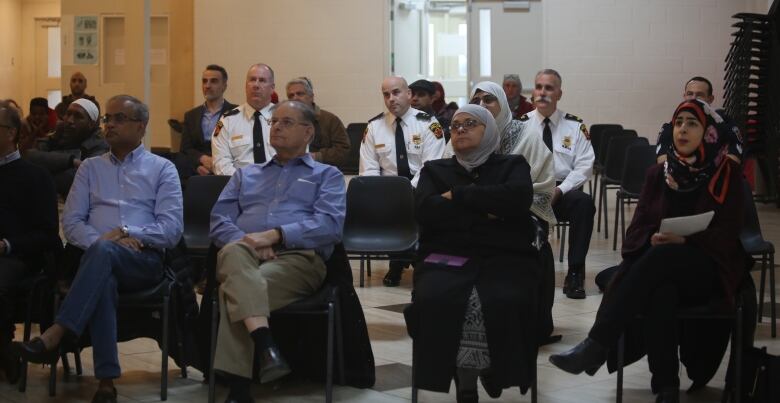Police take questions on active shooters and bulletproof shields during mosque town hall
Muslims question whether reporting hateful incidents makes a difference

In the face of rising Islamophobia and the deadly mosque attacks in New Zealand, Hamilton Muslims are increasingly asking themselves a terrifying question — what do we do if it happens here?
With that fear in mind, the Muslim Council of Hamilton invited police the the city's downtown mosque Thursday for a special town hall to try and ease the community's anxiety by talking about hate crimes, safety and what to do in an active shooter situation.
"It's been really disturbing. I picture myself with my family in the masjid then, God forbid if somebody were to walk in, feeling helpless," said Rabia Awan, who came to the town hall hoping for training on how to survive if a shooter attacks.
She wasn't alone.
At one point an audience member even asked whether the mosque would be permitted to buy bulletproof shields in order to protect members.

It was a question police had a difficult time answering, and it served to underline the fear in the community.
People come to a mosque to pray, not fight for their lives and many worshippers have no idea what to do if a someone comes through the door firing.
Run, Hide, Defend
"There's people who are scared," said Mohammed Uddin, a member of the downtown mosque.
"I want to learn about safety, how they're going to prevent things from happening to us."
Attendees were shown an instructional video about active shooter situations called Run, Hide, Defend.
It showed a man in dark clothing walking into a busy area, pulling a rifle from his bag and firing while people scream. All eyes turned attentively to the screen and some cell phones even come out to record the video as it played.
"A terrifying situation can happen at any time, any place, anywhere and it could happen to you," read the narrator in a sombre voice.
Awan said the video was informative, but it left her with several questions. The rooms where Muslims pray are often big and open, where would they take shelter if a shooter were to burst in? Also, men and women separate to pray. How can people hide when they don't know if their loved ones are in danger?
Tracking 'keyboard warriors'
Javid Mirza, head of the city's Muslim association, said he's especially concerned about an attack on a Friday, when hundreds of people coming to a mosque to pray will fill a parking lot, let alone the building itself.
"Put yourself in our shoes. It happened in Quebec, it happened here," he said. "Obviously we need to pay attention to that."
Police talked about ways the mosque can help prevent crime by improving lighting in their parking lot, trimming back bushes and increasing surveillance.
But Mirza pointed out no matter how much a mosque spends on security there's no sure way to stop someone bent on hurting Muslims.

His big concern is "keyboard warriors" who spread hate online.
"It's a mindset that needs to be changed," said Mirza. "People need to be aware that if they do say something or do something or post something online there are consequences."
Det. Paul Corrigan from Hamilton's Hate Crimes Unit said it's very difficult to identify people online who may do something down the road.
"We do keep track of people who we think would be a threat, people who have previously done something." he said. "If you report a person and then we see them doing something again ... if there's a criminal offence we'd have a clue as to who's doing it.
Questions about hate crimes
Still, the confusion on a few points was clear.
Several attendees said they've been told to go back where they came from or that Muslims are bad more times than they can count.
That launched a discussion on the difference between free speech and hate speech that included references to Yellow Vests protests in front of Hamilton City Hall where some people said they've seen "Islamophobic" signs and slogans.

"People can protest," explained Corrigan. "People can stand on Main Street and say I don't like immigrants. It's not nice, but it's not against the law, it's xenophobic, it may be racist, but it's not against the law."
His answer left some in the crowd frustrated and questioning why they should bother to report that type of incident if it won't lead to anything, but the detective said telling police about incidents like that is one of the best ways for the service to build an understanding of hate in the city.
"We rely on the community so much," he said, adding hate crimes are especially damaging because they can affect an entire community.

The questions kept pouring in as the call for the sunset prayer began.
Mirza said he's hoping the mosques can set up more town hall events with police to keep the conversations going.
"Much more needs to be done yet."